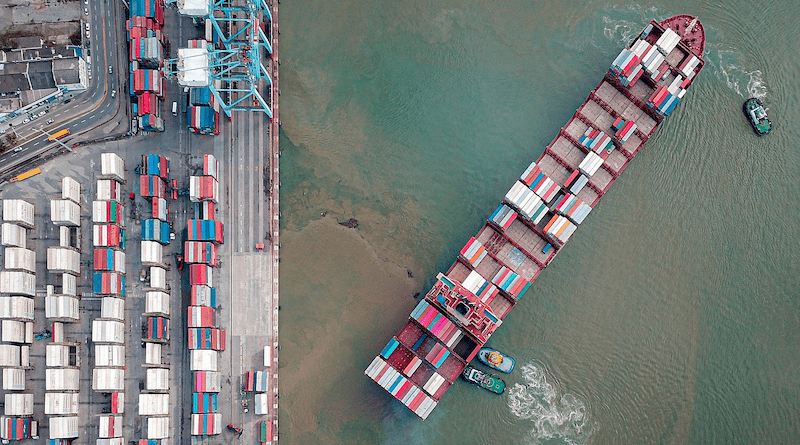At Davos, Four Initiatives For Greener, More Inclusive And Efficient Trade
“If we don’t succeed when it comes to the trade and investment agenda, we will not revive global growth.” So warned Børge Brende, President of the World Economic Forum, at a press conference highlighting a set of initiatives aimed at facilitating global trade in a time of increasing fracture, haunted by the threat of de-globalization and decoupling.
Two of the initiatives focus on eliminating bureaucratic red tape and harnessing technology to remove friction and boost the efficiency of trade and cross-border investment. The Global Alliance for Trade Facilitation, which now operates in 30 countries and is aimed at cutting trade costs and border delays, has saved nearly $60 million for beneficiary countries and has yielded a 600% return on investment.
Earlier in the week, USAID Administrator Samantha Power announced further support for the alliance, including incentives for private-sector investment in countries making tough reforms.
Meanwhile, a basket of initiatives focused on tradetech – the set of technologies and innovations that enable global trade to be more efficient, inclusive and equitable – including a pilot three-year partnership between the Forum and United Arab Emirates, hopes to use the cutting-edge technologies of the Fourth Industrial Revolution to streamline trade. Under the partnership, technologies such as blockchain, which might be harnessed to track shipments more efficiently, and AI algorithms that can optimize processes from the filing of paperwork to the loading and offloading of container ships, will be trialed and evaluated.
Other initiatives seek to bring more inclusivity to the flow of goods and investment capital and to promote trade policies that promote sustainability and climate-friendly goals.
The Draft Investment Facilitation for Development Agreement (IFD), under the auspices of the World Trade Organization, now includes over 110 WTO member countries and aims to attract investment to underdeveloped and developing nations where it is most badly needed, by improving the investment and business climates of those countries. According to Ahn Dukgeon, South Korea’s Minister of Trade, the agreement is now in its final stage, and is expected to be completed by the first half of 2023.
The Annual Meeting 2023 also saw the launch of the Coalition of Trade Ministers on Climate, an initiative that is currently co-led by the trade ministers of Ecuador, the European Union, Kenya and New Zealand. The coalition’s goal is to provide high-level political direction and guidance to bolster inclusive international cooperation on climate, trade and sustainable development, and promote trade policies that pursue climate action.
“We want this coalition to strengthen global collaboration on trade, climate and environmental sustainability,” said Valdis Dombrovskis, Executive Vice-President for an Economy that Works for People under the European Commission. “We are starting with a relatively small but fully committed group of countries and based on considerable interest so far, we are confident that others will join us as we develop our plans and showcase the potential of this coalition.”
“This coalition should also work to identify technologies and investments required to achieve Paris Agreement climate mitigation and adaptation strategies,” Dombrovskis added. “It should examine how trade can help to spread those technologies and facilitates the necessary investments around the globe, including in the most vulnerable economies, so innovative technologies help bolster climate mitigation.” He cited solar panels, wind turbines, green hydrogen and other technologies critical to the green energy transition.
Julio José Prado, Minister of Production, Foreign Trade, Investment and Fisheries of Ecuador, noted that his country is one of the most biodiverse countries in the world, and the sustainable preservation of that diversity is essential for key Ecuadoran export industries, like fishing and aquaculture.
“For our economies, there is no trade-off between trade and conservation,” said Prado.” It is just a matter of survival in the near future.”
He pointed to the successful 60% expansion of the marine preserve around the ecologically fragile Galapagos Islands, where fishing is not permitted. “We managed to get along, between the fishing industry and the conservation sector in Ecuador,” he said. “I think this is one [example] we can bring to this coalition of trade ministers that are working together towards conservation and to fight climate change.”
Prado also noted that the 50 countries represented in the Coalition of Trade Ministers on Climate include not only some of the world’s biggest economies, but small, vulnerable economies, including small islands. “Everyone needs to be included in this discussion,” he said.
Rachel Kyte, dean of the Fletcher School of Law and Diplomacy at Tufts University, said of the coalition: “You’re really bringing those agendas together in a positive, solution-oriented way. So how do we create the guardrails for a new technology to be able to be deployed into emerging markets or globally quickly? These are the kinds of solution-oriented conversations that we can’t manage without trade ministers embracing the agenda.”

